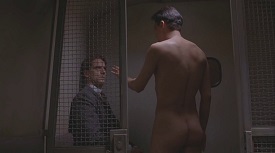Students have brainstormed a list of possible prisons. What cages do you see Hwang’s M. Butterfly breaking out of, or at least shaking their bars?


-
Recent Posts
Recent Comments
Athetraveler on My Chula Nathaporn Songsawas on The Sense of an Ending Co… Sasina on The Sense of an Ending Co… Narumol Choochan on The Sense of an Ending Co… ptanyamon on The Sense of an Ending Co… Archives
Categories
- British Fiction 2019
- English I
- Fiction and Fact 2019
- Halfglass
- OCARE August 2013
- Reading and Analysis 2013
- Reading and Analysis 2014
- Reading and Analysis 2015
- Reading and Analysis 2016
- Reading and Analysis 2017
- Reading and Analysis 2018
- Study of Literature 2017
- Study of Literature 2018
- Uncategorized
Meta

Throughout the story, we can see that there are multiple prisons at play. Some are breakable, some are unbreakable. Gallimard may be capable of breaking out of some prisons at some point in the story. However, focusing on the prison of his own imagination, Gallimard never escapes. Gallimard is imprisoned in his own imagination, and even though he knows how to break out of this confinement, he chooses to stay. On P.87, he says that he knows what Song really is, he knows Song is a man. He even adds that “…I knew all the time somewhere that my happiness was temporary, my love a deception. But my mind kept the knowledge at bay. To make the wait bearable.” (88) Some people might argue that this is the part where the prison of his own imagination is finally broken because he eventually admits that he knew it all along and walks out of the fantasy he created. But he later confesses that “I’ve finally learned to tell fantasy from reality. And, knowing the difference, I choose fantasy.” (90) At the end of Act Three, Scene Three, Gallimard proves himself that he is ” a pure imagination.” He takes the concept of the Orient he perceives and creates into his heart. This artfully stereotypical perception of the Orient that he has makes him mentally blind that he prefers to die in the prison. He chooses to commit suicide as Cio-Cio-San in order to save the perfect image of his ideal woman from being distorted.
Isn’t it ironic that Gallimard’s transformation from French male into Oriental female that you present as an unbreakable imaginative prison in fact de-essentializes those ironclad concepts? Nationality or race becomes changeable, no longer bound up with birthplace or parentage. Gender, too, becomes unstable and comes out of its fixed association with biology. What are some further implications on what is real and what is constructed that emerge from the effects of this ending scene? Has Hwang managed to do the impossible?
Opening the story by having the protagonist, Rene Gallimard, in a cell is not only to seek attention from the reader by making it unconventional, but also to imply the message in it that actually this character is both physically and mentally confined. There are many ways for us to define the prison that confine Gallimard. However, I come up with the idea that his belief about his love compares with the story Madamn Butterfly is the prison that imprisons him. Throughout the story, he always refers to Madamn Butterfly and tells the readers or the audiences that his love is like this story, having his lover Song Liling as Cho Cho San, the Eastern woman who is humble to her husband and he himself as Pinkerton, the Western man who is strong and masculine. This concept of love makes him expect his love to follow this line. Unfortunately, the prison is broken at the end since they both switched their roles. It has the clues along the play that the prison will break. For example, when his wife, Helka blames him for the inability to make a child which is considered as what good man can do (50). Finally, he escapes from this prison, his belief, by accepting that actually he is butterfly in the last scene. He is Cho Cho Sung who kill himself for unsuccessful love (93).
One of the interesting prisons in M.Butterfly by David Hwang is the prison of one own self or one own characteristics. There is a main character, Gallimard, who, first, has been locked up in this prison by the master key named “the poor appearance”.
Since Gallimard knows exactly he is not a good-looking man, his mind creates him cowardice and unconfident quality. He always thinks a man like him cannot win a beauty’s heart which, in effect, forces him to refuse any adultery even in the darkness (8). But then when he meets Song Liling, she seems like “a key” to free him from his miserable physicality. Finally, he can break out of his prison, the prison of unconfidence, to the world of power that he has never lived in. He is not a coward anymore, but the one who can control other people, even that people is just a submissive girl. However, it cannot be refused that in the end, he has been imprisoned again in his old unconfidence cell. He is too blind to see that Song Liling is not “a key”, but “a criminal” who illegally help him to break out of his own prison for her own benefit. Unconsciously committing the crime–revealing his country’s confidential information, Gallimard has been sent back to the cell he has left for 20 years. What is different now is he is willing to be captured since he does not care whether he would be brave or timid in the real world anymore. He learns that in his imaginary world, the world he created, he can be that man again, the man who has power over a woman; all he has to do is just waiting for that moment to come. Accordingly, I think Gallimard’s prison break is not deserved to be called a completely failed one, since he did break out once, but like those criminal who cannot thoroughly get away, he has to come back in the end.
Loving is about trusting, getting married is always based on faithfulness and reliance. However, In M. Butterfly, there is a breakout from faithfulness in one’s relationship. Gallimard, after being “faithful to my marriage for eight years” (14) decides to have an extramarital affair with Song, which basically means he breaks away from his marriage to another woman. Not only that he starts his relationship with Song, but he also has his extra-extramarital affair with Renee. For Song, even though she has no love for Gallimard in the first place, she uses his faithfulness as a tool to achieve what she wants, information. This kind of relationship, knowing by heart that one is not being faithful to another, lasts for almost twenty years. It triggers the suspicion about being in a relationship and the stereotypes. Even though breaking out of trustiness normally causes problems in relationships, that breakout plays a different role in this story. Gallimard says that “She knew the secret I was trying to hide But, unlike a Western woman, she didn’t confront me.” (56) The unfaithfulness becomes something that makes him feel more powerful towards Song, instead of being the cause to break up with someone. As the story progresses, we see that Song is the one who also plays with faithfulness, but with different aspects since she doesn’t love him at all. While love’s basic foundation is trust, David Henry Hwang breaks away from such a notion, saying that it could be just the opposite. And ultimately comes the question “Is the suicide of Gallimard the result of trying to break this chain of faithfulness in the first place?”
There are many kinds of prison in the play M. Butterfly, physical and abstract, and one of the abstract prisons is the prison formed by the image of oneself. A person’s image can come from themselves or from the outside source, like society, authority, or other sources. In Gallimard’s case, the image he has of himself, a western man, comes from what other people and society and literature tell him what a western man is like; he may not be aware of this image. From what he gathers, a western man is confident and in control, so he strives to be like this image he has in his mind; Song also helps him achieve this. In Song’s case, the image of a beautiful Oriental woman is already there, but the wearing is deliberate. He chooses to use this image to deceive Gallimard and trick him into telling him important information.
The prison breaks are there when Song sheds his kimono and goes for a suit instead for the French courtroom (81) and when Gallimard puts on his kimono, and make-up, and the Butterfly wig (92). These are the moments where Song and Gallimard break out of the cell—the images that they want other people to believe are them—and show people their true self. Song reveals himself as a cad, and Gallimard “reborns”—like his name—as the Butterfly.
This revealing of oneself does not come easily though. It seems to come when that person is forced or pressed. Song is forced to reveal himself because of the French courtroom, and Gallimard is pressed into doing it when he realizes his true self through thinking about Song.